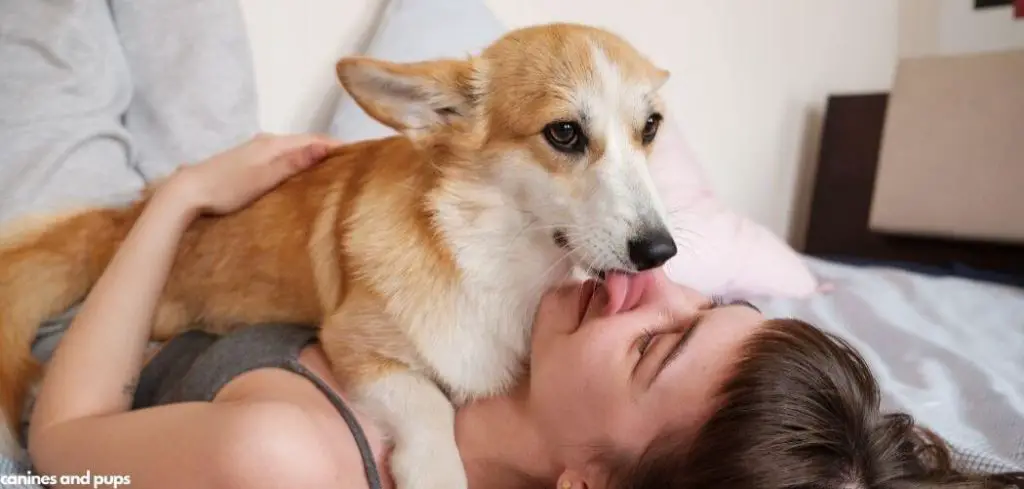It can be concerning to notice a dog excessively licking your arm, especially if it happens frequently or suddenly.
While occasional licking can be normal affection, constant licking may signal a mix of behavioral and medical issues.
We outline the common reasons why your dog may excessively lick your arm, what you can do, and when to seek veterinary help.
Dog Excessively Licking My Arm — Why It Happens
Your dog may excessively lick your arm as a way of seeking attention, expressing affection, or relieving anxiety. However, persistent licking may also point to skin irritations, nausea, pain, or compulsive disorders.
Sometimes it’s simply a habit reinforced over time, but in other cases, it can indicate something more serious that needs attention.

Dog Excessively Licking My Arm: Common Causes
Anxiety or Stress
Dogs often use licking as a self-soothing behavior when they feel anxious or stressed. Licking your arm can give them a sense of comfort and security.
You may notice it happens more during storms, fireworks, or when there are changes in the household. While it may seem harmless, excessive licking tied to stress can become compulsive if not managed.
Read more: Dog Excessively Licking My Feet (What it means)
Attention-Seeking Behavior
Many dogs learn quickly that licking gets a reaction from their owners. If you laugh, pet them, or talk to them when they lick your arm, they may repeat the behavior for attention.
While not dangerous, this habit can become excessive and interfere with normal interactions if it’s constantly reinforced.
Nausea or Gastrointestinal Upset
Licking, whether directed at objects, themselves, or your arm, is sometimes a sign of nausea. Dogs experiencing stomach discomfort may lick more frequently as a way to cope.
If licking is paired with drooling, swallowing, or eating grass, it may point to digestive issues that require a veterinary check-up.
Skin Irritation or Allergies
Sometimes dogs are drawn to lick human skin if there are scents, lotions, or even salty sweat. However, in some cases, they may be responding to their own discomfort.
If a dog is itchy or allergic, licking can extend beyond themselves and turn toward licking their owner’s arm excessively as a form of distraction or comfort.
Compulsive Behavior
In some dogs, licking becomes repetitive and compulsive. This condition, known as Canine Compulsive Disorder (CCD), may cause a dog to lick furniture, floors, or even their owner’s arm for long periods.
Compulsive licking is usually rooted in stress, boredom, or lack of stimulation and may need behavioral intervention or veterinary guidance.
Bonding and Affection
It’s important to remember that licking can also be a sign of affection and bonding. Dogs use licking to show submission, care, and closeness to their owners.
While normal in moderation, when it becomes excessive, it may need to be redirected to ensure it doesn’t develop into a problematic behavior.
What to Do If Your Dog Is Excessively Licking Your Arm
If your dog is licking your arm excessively, start by observing when and why it happens. If it’s tied to stress, provide calm reassurance and create a safe environment with toys, chews, or calming aids.
Redirecting their behavior is helpful. Offer chew toys, interactive play, or training exercises when the licking begins. This helps them shift the habit into a healthier outlet.
Avoid reinforcing the licking by not responding with laughter or petting when it happens. Instead, gently move your arm away and reward your dog when they redirect their focus.
For dogs with possible nausea or allergies, monitor for additional symptoms such as vomiting, itching, or appetite changes. If present, a veterinary visit is needed.
When to Call or Visit Your Vet
You should seek veterinary help if the licking becomes obsessive, interferes with daily life, or is accompanied by other symptoms such as vomiting, diarrhea, weight loss, or skin irritation.
If your dog seems anxious or restless and licking is their main coping mechanism, a vet can help rule out medical causes and may recommend behavioral therapy or calming supplements.
Compulsive licking that does not improve with redirection or management should also be evaluated, as it may require professional intervention to ensure your dog’s wellbeing.
Read more: Dog Excessively Licking My Face (Should you worry?)
Key Takeaway
Excessive licking of your arm may seem harmless, but it often points to an underlying cause that deserves attention. Whether it’s anxiety, habit, medical issues, or simply affection, understanding the reason helps guide the right response.
Providing enrichment, redirection, and reassurance can help in many cases, but if symptoms persist or worsen, a veterinary check is the best way to ensure your dog’s health and happiness.
